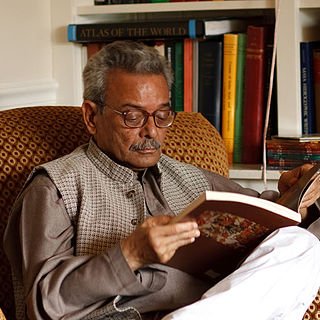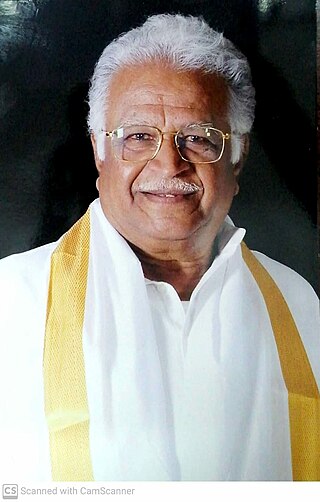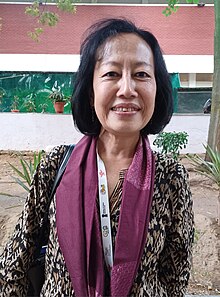
K. Satchidanandan is an Indian poet and critic, writing in Malayalam and English. A pioneer of modern poetry in Malayalam, a bilingual literary critic, playwright, editor, columnist and translator, he is the former editor of Indian Literature journal and the former secretary of Sahitya Akademi. He is also social advocate for secular anti-caste views, supporting causes like environment, human rights and free software and is a well known speaker on issues concerning contemporary Indian literature. He is the festival director of Kerala Literature Festival.

Mahasweta Devi was an Indian writer in Bengali and an activist. Her notable literary works include Hajar Churashir Maa, Rudali, and Aranyer Adhikar. She was a leftist who worked for the rights and empowerment of the tribal people of West Bengal, Bihar, Madhya Pradesh and Chhattisgarh states of India. She was honoured with various literary awards such as the Sahitya Akademi Award, Jnanpith Award and Ramon Magsaysay Award along with India's civilian awards Padma Shri and Padma Vibhushan.

Qurratulain Hyder was an Indian Urdu novelist and short story writer, an academic, and a journalist. One of the most outstanding and influential literary names in Urdu literature, she is best known for her magnum opus, Aag Ka Darya, a novel first published in Urdu in 1959, from Lahore, Pakistan, that stretches from the fourth century BC to post partition of India.

Pratibha Ray is an Indian academic and writer of Odia-language novels and stories. For her contribution to the Indian literature, Ray received the Jnanpith Award in 2011. She was awarded the Padma Bhushan in 2022.

Shashi Deshpande is an Indian novelist. She is a recipient of the Sahitya Akademi Award and the Padma Shri Award in 1990 and 2009 respectively.

Shamsur Rahman Faruqi was an Indian Urdu language poet, author, critic, and theorist. He is known for ushering modernism to Urdu literature. He formulated fresh models of literary appreciation that combined Western principles of literary criticism and subsequently applied them to Urdu literature after adapting them to address literary aesthetics native to Arabic, Persian, and Urdu. Some of his notable works included Sher-e-Shor Angez (1996), Ka’i Chand The Sar-e Asman (2006), The Mirror of Beauty (2013), and The Sun that Rose from the Earth (2014). He was also the editor and publisher of the Urdu literary magazine Shabkhoon.

Vijaydan Detha, also known as Bijji, was a noted Indian writer of Rajasthani literature. He was a recipient of several awards including the Padma Shri and the Sahitya Akademi Award.

Sitakant Mahapatra is an Indian poet and literary critic in Odia as well as English. He served in the Indian Administrative Service (IAS) from 1961 until he retired in 1995, and has held ex officio posts such as the Chairman of National Book Trust, New Delhi since then.

Namita Gokhale is an Indian writer, editor, festival director, and publisher. Her debut novel, Paro: Dreams of Passion was released in 1984, and she has since written fiction and nonfiction, and edited nonfiction collections. She conceptualized and hosted the Doordarshan show Kitaabnama: Books and Beyond and is a founder and co-director of the Jaipur Literature Festival. She won the 2021 Sahitya Akademi Award for her novel 'Things to leave behind'.
Rita Chowdhury is an Indian poet and novelist who writes Assamese literature and is a recipient of the Sahitya Akademi Award. She is the editor of the Assamese literary magazine Gariyoshi and a former director of the National Book Trust, India. She has been a professor and lecturer at Cotton College, Guwahati, Assam in the Political Science Department and was active in the Assam Movement in the early 1980s.

Literature from North East India (Assamese: উত্তৰ-পূৱ ভাৰতৰ সাহিত্য is literature in the languages of North East India and the body of work by English-language writers from this region. North East India is an under-represented region in many ways. The troubled political climate, the beautiful landscape and the confluence of various ethnic groups perhaps have given rise to a body of writing that is completely different from Indian English literature. North-East India was a colonial construct and continues to be one by virtue of having a historically difficult relationship with the Indian nation state.
Keki N. Daruwalla is an Indian poet and short story writer in English. He is also a former Indian Police Service officer. He was awarded the Sahitya Akademi Award, in 1984 for his poetry collection, The Keeper of the Dead, by the Sahitya Akademi, India's National Academy of Letters. He was awarded Padma Shri, the fourth highest civilian award in India, in 2014.

Shrilal Shukla was a Hindi writer, notable for his satire. He worked as a PCS officer for the state government of Uttar Pradesh, later inducted into the IAS. He has written over 25 books, including Raag Darbari, Makaan, Sooni Ghaati Ka Sooraj, Pehla Padaav and Bisrampur Ka Sant.
Abhiraj Rajendra Mishra is a Sanskrit author, poet, lyricist, playwright and a former Vice-Chancellor of the Sampurnanand Sanskrit University, Varanasi.

Padma Sachdev was an Indian poet and novelist. She was the first modern woman poet of the Dogri language. She also wrote in Hindi. She published several poetry collections, including Meri Kavita Mere Geet, which won the Sahitya Akademi Award in 1971. She also received the Padma Shri, India's fourth highest civilian award in 2001, and the Kabir Samman for poetry for the year 2007-08 given by Government of Madhya Pradesh, Saraswati Samman for the year 2015, Sahitya Akademi Fellowship in 2019.
Usha Kiran Khan was an Indian writer who worked in the Hindi and Maithili languages. She was also an academic historian.

Kolakaluri Enoch is an Indian writer, teacher, and former Vice Chancellor of Sri Venkateswara University, Tirupati. He was honoured by the Government of India, in 2014, by bestowing on him the Padma Shri, the fourth highest civilian award, for his contributions to the field of literature.
Ale Ahmad Suroor (1911-2002) was an Urdu poet, critic and professor from India. He is best known for his literary criticism. In 1974 he was honoured with the Sahitya Akademi Award by the Government of India for his literary critic work, Nazar aur Nazariya. In 1991 he was also awarded the Padma Bhushan, India's third highest civilian award. He was awarded a special gold medal by the President of Pakistan on the centenary of the birth of Muhammad Iqbal.

Aleph Book Company is an Indian publishing company. It was founded in May 2011 by David Davidar, a novelist, publisher and former president of Penguin Books Canada, in association with R. K. Mehra and Kapish Mehra of Rupa Publications. The headquarters of the company is situated in New Delhi.














